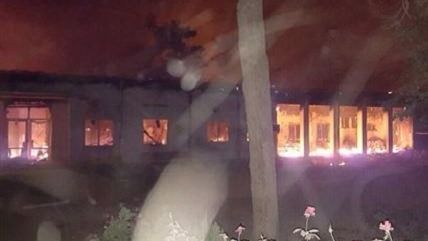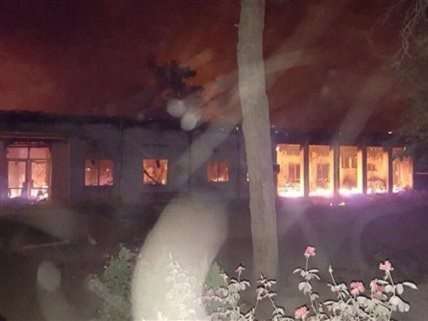U.S. Airstrikes Hit Afghan Hospital—Bombardment Lasted Nearly an Hour
Last week President Obama asked us to compare terrorism to gun violence. Maybe we should.


The U.S. war in Afghanistan may have officially ended in 2014 (insofar as a "war" can officially "end" while military assets are still deployed in the battlespace), but U.S. involvement in the war in Afghanistan continues, albeit with far less media coverage than it has historically received.
Until something particularly awful happens. Reuters reports:
An airstrike hit a hospital run by Medecins Sans Frontieres in the Afghan city of Kunduz on Saturday, killing several people in what the U.S. military called possible "collateral damage" in the battle to oust Taliban insurgents. At least 19 people died in the strike, according to Medecins Sans Frontieres, including 12 staff, four adult patients, and three children.
Frantic MSF staff phoned military officials at NATO in Kabul and Washington after the attack, and bombs continued to rain down near the medical facility for nearly an hour, one official from the aid group said.
At least 37 people were wounded and many patients and staff still missing, it added.
Last week, after the shooting at a community college in Oregon, President Obama asked news organizations to compare the number of fatalities due to terrorism in the last 10 years versus the number of fatalities due to gun violence in the last 10 years. He argued:
We spend over a trillion dollars, and pass countless laws, and devote entire agencies to preventing terrorist attacks on our soil, and rightfully so. And yet, we have a Congress that explicitly blocks us from even collecting data on how we could potentially reduce gun deaths. How can that be?
There's a logical fallacy here—maybe even the elusive "begging the question." That we've spent trillions of dollars, passed countless laws, and created brand new bureaucracies as a response to 9/11 doesn't necessarily make that a "rightful" response.
Once upon a time, when he was just a candidate, Barack Obama (at least pretended he) understood that. As a senator, Obama was a critic of the Bush administration's prosecution of the war on terror before he got within spitting distance of the White House and changed his tune.
Terror warriors dream of a counterterrorism regime where civil liberties take a back seat to national security. After all, they argue, you have nothing to worry about if you have nothing to hide. Police procedural television shows like Law & Order elicit a similar attitude about crimefighting. "If only it weren't for all those pesky constitutional rights that protect criminals." But that's what those constitutional rights are for, to protect criminals because only when criminals get protections can all the rest of us. Otherwise all the government would have to do is deem us a criminal, or a terrorist, to strip us of our rights. It tries to do this anyway.
The idea of "balancing" civil liberties and safety is a false one. So arguments about tactics like "stop and frisk" being ineffective are a red herring. Some apologists for the tactics can argue it is effective. But that's not relevant. "Stop and frisk" systematically violates people's Fourth Amendment right. By that measure alone the policy, and any policy that is unconstitutional, should be rejected, effective or not.
It's similar with gun violence. Violent crime, with or without the use of a gun, has seen a dramatic drop over the last twenty years even as some old gun control laws have expired. Hard cases make bad law—it was the case with 9/11 and the war on terror, something many Democrats said they understood, until Barack Obama won the presidency and took charge of the war on terror. And it's the same case with gun violence. Violent crime rates are down. Giving in to policies wrought of emotion can only lead to bad laws and systemic violations of constitutional rights, just as giving in to emotion after 9/11 did.
It's a good lesson Obama tried to impart, even if he was trying to apply it the wrong way.


Show Comments (163)